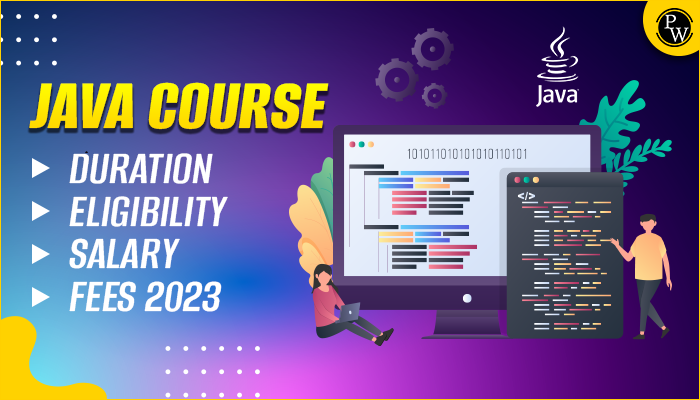Java Or Python: In the competitive world of programming languages, Python and Java are two powerhouses, each with its unique strengths and weaknesses. For aspiring developers and seasoned professionals, choosing the right language to learn is a pivotal decision that can shape one’s career trajectory. Python and Java differ a lot in use cases, ease of use, beginner-friendliness, and more. Hence, in this blog, we’ll compare Java and Python and tell you which one you should choose between Java or Python in 2024.
If you want to make a successful career in web development, PhysicsWallah has got you covered! Enroll in the Full Stack Web Development Course and learn everything you need to become a job-ready web developer in 2024!

What Is Java?
Originating in the mid-1990s from Sun Microsystems, Java stands out as a versatile, object-oriented programming language renowned for its platform independence. Following the “Write Once, Run Anywhere” (WORA) principle, Java enables code to operate on any device equipped with a Java Virtual Machine (JVM). This characteristic renders Java highly attractive for expansive enterprise applications, mobile app development (Android), and web development.
Java shares a syntax akin to C++, aiding developers accustomed to C-based languages. Strong typing in Java detects errors during compilation, boosting code robustness. The language also supports multithreading, facilitating the development of concurrent and scalable applications.
Also read: Java Tutorial For Complete Beginners
What Is Python?
Known for its simplicity and clarity, Python emphasises readable code. Its syntax enables expressing ideas in fewer lines compared to Java or C++. Python’s adaptability is apparent in its wide applications, spanning web development, data analysis, artificial intelligence, and scientific computing.
Python, founded by Guido van Rossum in the late 1980s, boasts dynamic typing, letting developers code swiftly without explicitly stating variable types. It supports various programming styles: procedural, object-oriented, and functional.
Also read: Python For Data Science Syllabus, Important Topics, Projects
Java or Python: Which Is Better in Use Cases?
Here we compare Java and Python use cases:
Python Use Cases
Data Science and Machine Learning
Python dominates data science and machine learning. Key libraries, like NumPy, Pandas, and scikit-learn, offer potent tools for data handling, analysis, and model building. Python’s straightforward syntax appeals to data scientists, allowing them to tackle intricate problems without drowning in complex code.
Web Development (Django, Flask)
Python excels in web development, thanks to frameworks like Django and Flask. Django, a top-tier framework, prioritises quick development and adheres to the “Don’t Repeat Yourself” (DRY) principle. Meanwhile, Flask, a nimble alternative, grants developers flexibility and control. Python’s adaptability in web development spans from modest projects to expansive enterprise applications.
Automation and Scripting
Python’s ease of use and readability make it an ideal language for automation and scripting tasks. Whether automating repetitive tasks, managing system configurations, or scripting for network administration, Python’s simple syntax and extensive standard library empower developers to accomplish tasks efficiently. The language’s ubiquity in these domains has contributed to its popularity among system administrators and DevOps professionals.
Java Use Cases
Enterprise-level Applications
Java serves as a cornerstone in constructing large-scale enterprise applications, prioritising stability, scalability, and reliability. Its object-oriented design and robust architecture make it ideal for intricate, mission-critical systems. Widely employed tools like Enterprise JavaBeans (EJB) and the Spring Framework play a crucial role in crafting scalable and modular enterprise applications.
Android App Development
For years, Java has been the go-to language for crafting Android apps. Android Studio, the official tool for app creation, fully backs Java, empowering developers to build robust and high-performing mobile applications. Even with Kotlin emerging as an Android development contender, Java stays a crucial proficiency for app creators.
Big Data Processing (Hadoop, Spark)
Beyond mobile apps, Java plays a vital role in major data processing systems like Apache Hadoop and Apache Spark. These frameworks tap into Java’s prowess in distributed computing, enabling the efficient handling of massive data sets across clusters. Java’s knack for managing extensive data tasks positions it as the top choice in the realms of big data analytics and processing pipelines.
Java or Python: Which Is Better for Placement?
Python
The demand for Python coders has sharply risen, fueled by its adaptability and widespread use in emerging domains like AI, machine learning, and data science. Businesses, both small and large, actively seek Python developers for web tasks, automation, and crafting smart systems. Python’s job market strength endures as the hunger for data-driven insights expands.
Java
Java developers continue to be in high demand, particularly in sectors where large-scale, enterprise-level applications are prevalent. The financial industry, healthcare, and government sectors often rely on Java for building secure and scalable systems. Additionally, Android app development has sustained the demand for Java developers, with millions of Android devices in use globally.
Java vs Python Salary
Salaries differ due to factors like experience, location, and industry. Python and Java developers both earn competitive pay. Those focusing on data science and machine learning in Python have an average yearly salary of ₹5,42,833. In contrast, Java developers skilled in enterprise-level apps and Android development earn an average of ₹5,10,953 annually.
Java or Python: Which Is Easy?
Python
Beginner-friendly Syntax
Python’s syntax is designed to be intuitive and readable, making it an excellent choice for beginners. The absence of complex symbols and the use of indentation for code blocks contribute to a gentle learning curve. Aspiring developers can quickly grasp fundamental programming concepts without being hindered by convoluted syntax.
Abundance of Learning Resources
The Python community is renowned for its inclusivity and abundance of learning resources. From online tutorials and documentation to active forums and community-driven initiatives, aspiring Python developers have access to a wealth of materials. The support from the community plays a crucial role in helping newcomers overcome challenges and grow their skills.
Java
Complex Syntax and Concepts
Java’s syntax, influenced by its object-oriented nature, can be more verbose and intricate compared to Python. Understanding concepts like classes, interfaces, and memory management requires a deeper level of comprehension, making Java’s learning curve steeper for beginners. However, this complexity contributes to the language’s robustness and suitability for large-scale applications.
Strong Community Support and Resources
Despite its steeper learning curve, Java benefits from a strong and well-established community. Numerous online resources, tutorials, and forums provide support for learners at various stages. Additionally, the Java community’s emphasis on best practices and design patterns ensures that developers gain valuable insights into writing maintainable and scalable code.
Also read: Top 10 Reason Why You Should Learn Python in 2024
Java or Python: Future Trends and Popularity
Python
Rise in Machine Learning and AI Applications
Python dominates in AI and machine learning, with TensorFlow and PyTorch reinforcing its status as the top language. The widespread need for AI solutions guarantees Python’s ongoing appeal.
Community and Industry Trends
Python’s vibrant community and its adaptability to diverse domains contribute to its sustained popularity. As new technologies and paradigms emerge, Python developers actively contribute to open-source projects, shaping the language’s evolution. The language’s versatility positions it as a frontrunner in emerging fields such as quantum computing, edge computing, and blockchain development.
Java
Robustness in Enterprise Solutions
Java’s robustness and stability make it a reliable choice for building enterprise-level solutions. As industries evolve, the need for secure and scalable applications persists, ensuring that Java remains relevant in sectors where reliability and performance are paramount. Legacy systems and large-scale projects often rely on Java for their development and maintenance.
Long-standing Industry Support
Java’s long-standing presence in the industry, coupled with its commitment to backward compatibility, instil confidence in businesses relying on Java-based systems. While newer languages may gain popularity for specific use cases, Java’s established track record and comprehensive ecosystem ensure its continued use in a wide range of applications.
Conclusion
In the dynamic landscape of programming languages, the choice between Python and Java is a pivotal decision that hinges on various factors, including individual preferences, career aspirations, and the specific demands of the projects one aims to tackle. Both languages have distinct advantages and disadvantages, and their relevance extends across different domains and industries.
Also read: Top 15 Java Projects With Source Code [2024]
FAQs
How does Python's dynamic typing affect the pace of development?
Python's dynamic typing speeds up development by enabling coders to write without explicitly defining variable types, minimising the necessity for boilerplate code.
How is concurrency managed in Java applications?
Java utilises a multithreading model to handle concurrency, enabling the execution of multiple threads simultaneously for creating scalable and responsive applications.
Is Java exclusively employed for web development?
Java extends into diverse realms, not limited to the web; it's integral in enterprise software, Android app creation, and server-side applications.
What is the role of Hibernate in Java development?
Hibernate operates as a vital Object-Relational Mapping (ORM) tool in Java, smoothing database interactions and easing the workload for developers handling relational databases.
Can Python be utilised for machine learning applications?
Python holds a significant position in machine learning, backed by potent libraries such as TensorFlow and scikit-learn, delivering formidable resources for crafting and implementing machine learning models.



